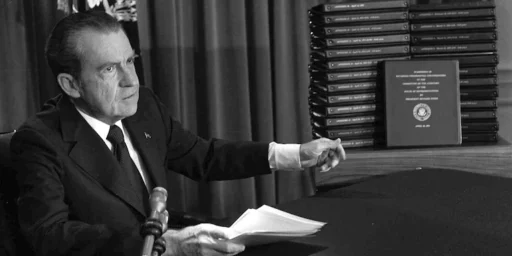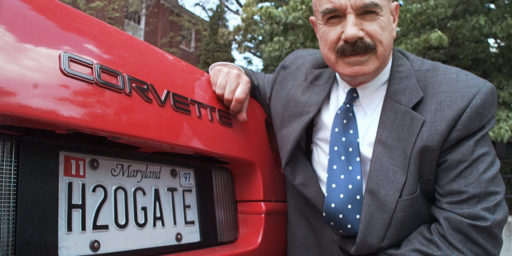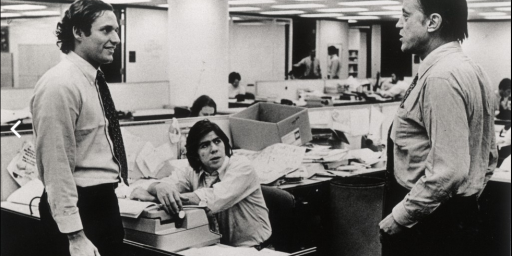Watergate Forty Years Later
Even with the passage of time, Watergate remains a singularly important event in American history
Forty years ago today at Noon Eastern Time, Richard Milhous Nixon became the first and so far only President to resign from office, bringing and end to a scandal that had engulfed his Presidency after his historic landslide win in the 1972 election and putting Gerald Ford in office as the first President of the United States who had never been elected as either President or Vice-President before assuming office.. In the time that has passed, Watergate has gone become part of American political memory to the point where pretty much every political scandal that has followed has had the suffix “gate” attached to it in some way or another. Even more than the impeachments of Andrew Johnson and Bill Clinton or things like Iran/Contra or the various Clinton scandals, it arguably stands as the single worst political crisis in American history and one which has shaped our political culture in innumerable ways ever since. As Politico’s Nicholas Fandos notes, however, in many ways the dark days of Watergate are fading from memory, leading one to wonder just how it it will be viewed by history in the end:
At the time, it must have all seemed unforgettable: the endless revelations of wrongdoing, the painful congressional investigation and, finally, the soft black-and-white image of Richard Nixon resigning the presidency.
But ask today’s students about the events of Watergate 40 years ago and odds are that many have never heard of the scandal, or, at best, are vaguely aware that something happened once that lives on in a suffix attached to the occasional controversy.
A major reason is that in U.S. classrooms and textbooks, the discussion of Watergate is going the way of the Teapot Dome Scandal and the Petticoat Affair: increasingly simplified and shortened.
“Watergate is just slowly being condensed, as is the entire time period,” said Kyle Ward, a professor at St. Cloud University in Minnesota who has studied the evolution of American history textbooks. “We are not spending as much time as they did in the late ’70s and early ’80s dwelling on Watergate.”
Lesson plans and textbooks don’t have the space for nuanced discussions about the House Judiciary Committee’s political motives or the legality of forcing Nixon to release his Oval Office recordings. And demanding national and state testing standards only add to the pressure on teachers to move through events such as Watergate faster, they say.
That can make for some interesting moments with students.
“Usually they are pretty surprised to find out that Watergate was a hotel, that it was a standing building that had office spaces in it,” said Matt Moore, who teaches at Mankato West High School in Mankato, Minnesota.
Francis Couvares, a history professor at Amherst College, said his students know “almost nothing” about the scandal. “Why would they?” he adds.
Ryan Moran, who just graduated from Warren Hills High School in New Jersey, said that although Watergate attracted better-than-average interest from his classmates, they were generally more intrigued by subjects such as Vietnam or World War II.
“I think people know the word, but they don’t know what it means — most high schoolers, anyway,” he said.
Historiographers (those who study the study of history) say the case of Watergate is really nothing new. History is always under revision, after all, becoming more compact over time as the event recedes. Blow-by-blow details are slowly replaced by an assessment of impact and legacy.
Watergate is somewhat unusual in that its impact still lingers in the public realm, even as knowledge of its details become less ubiquitous. The same students who know nothing about the scandal’s finer points live in a culture shaped by everything from open-records laws to hyperpartisanship in Washington.
Several teachers interviewed said they tend to budget two or three class periods for Nixon’s entire presidency. After discussing Nixon’s rise, his foreign policy and the Vietnam War, that leaves just half a class or less for Watergate.
“It is painful to have to teach a topic like Watergate in a half an hour or 45 minutes, but it’s reality,” said Eric Hahn, who has taught high school history for more than 20 years in a wealthy suburb outside of St. Louis.
Related to this is a new CNN/ORC International poll that shows that the public attitudes toward Watergate have changed significantly over the years, and that they vary depending on the age of the respondents:
Four decades after President Richard Nixon resigned, a slight majority of Americans still consider Watergate a very serious matter, a new national survey shows. But how serious depends on when you were born.
The CNN/ORC International poll’s release comes one day before the 40th anniversary of Nixon’s resignation on August 9, 1974. With the Watergate scandal escalating, the second-term Republican president had lost much of his political backing, and he faced almost certain impeachment and the prospects of being removed from office by a Democratic-dominated House and Senate.
There’s a big generational divide over the significance of the scandal, with a majority of those older than 40 describing Watergate as a very serious problem and those under 40 saying it was just politics.
It isn’t too surprising that people who weren’t even alive during the Watergate scandal, or were too young to really appreciate its impact, don’t have the same view of it that older people do, of course. For these people, Watergate is nearly as far back in time as the Teapot Dome scandal was for those who were younger adults in the early 1970s. These people didn’t have the same emotional investment in the Nixon Presidency that the rest of the country did, for example. Personally, I was six years old on the day that Richard Nixon left office and, while I do remember watching it happen on television at the time, I can’t say that I fully appreciated what was going on. More importantly, they have grown up in a post-Watergate era in which cynicism about politicians and the operation of government has been a part of the political culture and, indeed, has reached record levels in recent years. Given that, it’s probably hard for someone teaching history to explain to them why Watergate is really different from what they unfolds on cable news, talk radio, and the Internet on a daily basis today.
That being said, it is important to recognize that, in many respects, Watergate, a term which as come to encompass not just the break-in and cover-up but also a whole host of other nefarious policies and actions during the Nixon Administration, really is unique in American history. For one thing, it was serious enough to lead to the first and only Presidential resignation, and had Nixon not resigned he would most assuredly have been impeached and removed from office. Additionally, the scandal involved Presidential manipulation at its most extreme levels. In addition to spying on political enemies, Nixon and his cronies attempted to interfere with and FBI investigation, use the IRS for political purposes, break into to a psychiatrists office to get information about Daniel Ellsberg, and cover-up a crime. When it became clear that the investigation was getting too close to the White House for comfort, the President removed the Special Prosecutor from office, although he lost an Attorney General and Deputy Attorney General in the process. Numerous top Nixon associates went to jail because of their actions.
Finally, there’s simply the fact that Richard Nixon is, for better or worse, one of the most fascinating political characters in American history.. From the dawn of the Cold War to the fall of the Soviet Union, he played a role some way. Even in his final days, he apparently became something of an informal counselor to Bill Clinton, who had worked on a campaign to beat him back in 1972. Stephen Ambrose captured much of this aspect of Nixon in his three volume biography which covered the period up until his loss to Pat Brown, his resurrection and downfall, and then his improbable rebirth as an elder statesman. Whatever one might think of him, it’s hard to deny that Nixon was one of the most influential American political leaders of the later half of the 20th Century. For that reason alone, the events that led to his downfall and removal from office are something more than just another political scandal.
The night before he left office, President Nixon addressed the nation in what remains one of the most important Oval Office addresses in history. This version of the video includes excerpts of Nixon rehearing before the speech started, the actual speech starts at the 7:02 mark:
]
And mere hours before he left the White House as President for the last time, he gave a speech to the White House Staff that said as much about him as it did anything else.
Hopefully, the nation will never have to live through something like this again, but the possibility that it will becomes more likely if we forget what Watergate was really all about.







I was in Europe a good deal of the time that the scandal was unfolding. The Europeans simply couldn’t understand what the hubbub was about.
The lesson is if you want to wiretap your opponents, you use a surrogate.
Like the Democrats do with Mother Jones Magazine.
funny, it’s just called “politics” now. too bad nixon had to fall on the sword for that, that’s how we wound up with jimmy carter in the white house- a huge price to pay for such a small foul.
Like Dave I too was in Europe at that time. I got most of my news from The International Herald Tribune. I don’t remember German TV or newspapers giving it much coverage at all.
I think that part of the reason younger people think it is “just politics” is because so many people have spent years telling them that it is. From the ubiquitous -gate ending on every scandal to the constant refrain of “what got Nixon in trouble was the coverup,” especially since these things are applied to every single little non-scandal outrage that makes the news for a day, the uniqueness of Watergate can be hard to grasp for those who don’t really understand what it was all about in the first place.
I am too young to remember anything about Watergate first hand. I do remember my mother explaining it to me by saying “The president did something bad” and that remained my level of understanding until after high school. What I learned about it was from my own interest and reading. It was never covered in school that I recall. That was the 80s.
The most fascinating television I ever watched was the edited replay of the House hearings on Watergate that was shown on a cable channel (History? A&E?) leading up to the impeachment of Bill Clinton. I canceled appointments, stayed home and just watched TV as long as those were on. The whole time I was thinking how agonizing this must have been to live through.
My grade school history education honestly never got past World War 2. In-depth on all the centuries beforehand (I got to learn a lot about James Polk and the Mexican-American war), but next to nothing past World War 2. The only bits of history taught from that were in elementary school and covered as much depth as you might expect elementary school history class to cover.
In-depth stuff on anything past 1950 requires a college class devoted to it, or more likely a college class that is on something else but uses tangential materials from those periods as illustration. I didn’t read Letters from a Birmingham Jail until I took a political theory class, for instance. I imagine the various “X Studies” classes get into the recent history more, but those aren’t required for basic graduation credit.
Public education doesn’t concern itself with relatively recent events like this. It gives a quick summary if any and then points you towards other things to read for yourself. Given this, I’m not too surprised most people consider Watergate as politics as usual, especially given the level of attention the media gives every possible scandal nowadays.
Happy to be of help…
Conservatives love to bash Carter, but considering the disaster that was the George W. Bush Presidency and how we are and will be paying for that, Carter in the White House doesn’t seem like much at all by comparison…
I actually worked for President Nixon as a 17 year old in his Multnomah County office in 1972, and was deeply disappointed with Watergate. It was a very unsettling event for me, realigning most of my votes for Democratic candidates for office from 1974 on. – In the 1960’s, I considered both John Kennedy and Richard Nixon as two of the most skillful politicians of the era, although Lyndon Johnson probably achieved far more actually accomplished than either. It was good that both Kennedy and Nixon were president, as both were two of the best politicians America once had. But, Nixon’s own paranoid problems, of his own making, were self-destructive. He fell on his own sword…
Even as one who lived through it, it is safe to say that most of the details have faded from recallable memory.
@Paul L.: @bill: Ahh yes, two more casualties of the 24/7 news cycle, representative of a rather large part of an American electorate that has an increasingly difficult time separating hyperbole from reality.
@An Interested Party:
Who did Fox News wiretap?
Mitt Romney and Mitch McConnell were wiretapped by Mother Jones magazine.
@bill:
Jimmy Carter was responsible for much of Reagan’s success.
He appointed Volker…and he removed oil price controls.
Absent Volker and extremely low oil prices Reagan had next to nothing.
Of course that doesn’t fit your mythology.
I was stuck in the hospital for much of the aftermath of Watergate…and so I watched a lot of it unfold.
But be sure to keep in mind…Benghazi/IRS/Fast and Furious are far worse.
I was living in DC at the time and went from voting for Nixon to demonstrating for his impeachment.
The whole thing taught me a valuable lesson: Yes, intelligent people like Nixon actually can do amazingly stupid things. Never underestimate the capacity of smart people to do dumb things.
That said it was huge fun for political junkies. We would leap out of bed in the morning to grab the Washington Post and see what was coming next. I remember the Alexander Butterfield at the Ervin committee:
“Everything was taped.” Let me tell you, the earth stopped rotating, the birds stopped singing, no one breathed, silence descended over the land, you could have heard a pin drop in Washington DC at that moment. It was bad for Nixon before then but the smart money was that he’d find a way to survive. And then Butterfield opened his mouth and we all knew Nixon was going down.
I was 19-20 at the time, working as a library grunt and occasional paralegal at Wilmer, Cutler and Pickering in DC. 40 years and nothing in politics since then has ever equaled that out-of-body, oh. my. god. effect on me.
The worst legacy of the Nixon Years was Ford’s pardon, after Congress assembled the courage to impeach. It taught little Rummies and Cheneys and later young Georgies and Condis that the penalties for subversion of government, torture, and lies into wars resulting in the deaths of hundreds of thousands of people would be nothing, nothing at all.
Congress had the courage, once. The trial would not have “torn the country apart.” It would have exposed many more people in Nixon’s treason, the worst of which was meddling in the Vietnam peace talks just prior to the 1968 election in violation of the Logan Act.
Well, in many ways they are. And no just because people died in those recent scandals. No, the real reason is because Watergate, contrary to mythology, was uncovered and pushed to prosecution by a functioning republican sense. Prosecutors, investigators, etc. are the ones to ferreted out the crimes and used their offices to leverage their way all the way to the Oval Office. Woodward and Bernstein were fed information but months after the fact and their mythical source, Deep Throat, has been proven and shown the information was really just using the WP to handle some bureaucratic politics instead revealing substance to the main corruption.
This 1974 column lays it out and has been proven to be accurate
via Powerline
We heard that pin drop all the way here in the midwest.
I couldn’t have said it better. I wouldn’t even try.
@James in Silverdale, WA: My parents to this day can’t forgive Ford for pardoning Nixon. While they have at one time or another been suaded by the idea that it “healed a rift” in the country, they adopt a “fiat justitia ruat caelum” stance to Constitutional dangers like this. The integrity of the system itself was put in jeopardy.
@Tillman:
Well it’s unforgivable. Unelected Ford’s rush to grant clemency and shut er down before all the data were in was (un)justified by the need to heal right now and avoid the pain of disinfecting sunlight . An honest man would have insisted either that Nixon come clean or the investigations fully play out.
And even then, leave clemency up to an elected successor.
@rudderpedals:
Quite a few liberals feel this way about Obama’s refusal to go after Bush-Cheney.
What’s more, that refusal especially stung since liberals know that had shoe been on the other foot, the right wing would be showing no mercy, national healing be damned. Look at their prosecution of the fictional BENGHAZI! and IRS! scandals, not to mention Whitewater and Fostergate.
Maybe its time for liberals to be ruthless, next time we have the goods on conservatives. If they give no quarter, make no apologies, and acknowledge no prior wrongdoing, why should us liberals?
@Paul L.:
Given the ubiquity of cell phones, anyone who thinks that a comment made at a public event (such as a fundraiser) to a room full of people is not going to be heard by a wider public is a fool.
Recording what an individual says when they are standing right in front of you and speaking clearly is not ‘wiretapping’ by any stretch of the imagination. And the only reason anyone should be surprised that those remarks made it to the wider public is because they’ve forgotten that wait staff are human beings.
Thank goodness that’ll never happen again.
I always have wondered about the timing of the Watergate “scandal”. Think about it. You had a gas “crisis” that included long lines, rationing, and of course rising prices (gouging). Gas “stations” closed down. The country was held hostage by the powerful gas companies (oil/government complex). The economy was being hurt, and the government seemed helpless and did not know what to do. People were getting angrier and angrier. President Nixon promised an investigation to get to the bottom of it. Then the next thing we know this Watergate stuff blows up and Nixon is gone. Coincidence?
Now, of course, we know that there was no “shortage”: there was so much oil that they ran out of storage tanks. After they converted all of the service stations to “convenience” stores, they reopened and there was plenty of gas (at twice the price). “Convenience” stores: with their snack and drink prices double what you would pay at a grocery store. And their air pumps that now charge a dollar and don’t work half the time. Air used to be free at the service stations.
The gas “crisis” of ’73: the biggest hoax ever pulled on the American people.
You used so much of it to fill the empty space in yer head they had to start charging!
@Tillman:
Me neither.
My feeling is that a photo of Nixon behind bars, even for five minutes, would have done wonders for ethics in high places. And there was always the feeling there was worse stuff we hadn’t seen.
I don’t recall polling data from the time, but I don’t recall there being any great rift in the country. The evidence of serious wrongdoing was clear, Nixon was gone, his removal had been bipartisan, a Republican was still President. It was basically over until Ford gave him “a full, free, and absolute pardon unto Richard Nixon for all offenses against the United States…” One had to wonder what was in “all offenses” that Republicans didn’t want us to know about.
@gVOR08: In fact, one wondered what Nixon knew and was holding over his fellow GOPs heads to get the pardon.
Richard Nixon was Vice-President from 1953 to 1961 under President Dwight D. Eisenhower.
At 5 years old in 1953 you would’t think I would remember much. But I ‘m sure I saw news film on TV when Nixon went to South America in 1958.
My dad was a Nixon guy when he ran vs John Kennedy. All I remember of that was “Kennedy is too young.” If there was any religious bias (we were Missouri Synod Lutheran) I never heard a word of it from my parents.
I was as wrapped up in the campaign as any 12 year old could be. When Nixon did a campaign stop at the Rochester-Monroe County (NY) airport my dad took me to see “The Next President of the United States” in person! What’s left of my memory of that event is Nixon standing outside of the door of the plane at the top of the rolling stairs in use at the time. We were at the back of the crowd.
Needless to say if only I could have predicted the future I would have brought along a camera.
My dad must have detected excessive zeal on my part as I remember him cautioning me that Nixon’s victory was not a sure thing and I should not be too let down if he lost.
I was in tears the day after the election as we discussed the results in 7th grade history class.
“Do you think Nixon would win if the election was done over again?” I asked.
“I don’t see that it would make any difference.” replied the teacher.
I was a year shy of legal voting age (21) in 68 when he defeated Humphrey. After the riots at the 1968 Convention in Chicago I had no love for the Democrats. Nixon’s Negative Income Tax seemed like a progressive idea at the time.
By the time Tricky Dick ran again in November of ’72 against George McGovern and had established the Committee to Reelect the President (CREEP) 21,000 more United States Troops had come home in body bags. This after his ’68 campaign promised “peace with honor” in the Vietnam War and proclaimed that “new leadership will end the war and win the peace in the Pacific”.
April 30, 1970 Nixon announced the invasion of Cambodia. Days later four American Citizens lay dead on the campus of Kent State University. Murdered by United States soldiers.
I saw McGovern at the Sleepytown Airport on a campaign tour. Nix on Nixon! Was the campaign cry.
In the summer of ’73 someone ripped the “Impeach Nixon Now More Than Ever” bumper sticker from the tailgate of my 1960 F-100.
October ’73. The Saturday Night Massacre. November ’73 “I am not a crook.”
By the time the Supreme Court ordered Nixon to turn over the tapes there was much speculation that he had already destroyed them.
The night in August that Tricky Dick gave the resignation speech the owner of my favorite swill hole, a Greek fellow who had forever been calling Nixon “That fu*king bastard” (he pretty much called everyone that) bought the house a round for what still stands as the only time.
A good time was had by all!
President Richard M. Nixon was the Head of the Government, the Head of State and “Commander in Chief of the Army and Navy of the United States, and of the Militia of the several States,..“.
The fact that not one member of the United States Armed Forces followed him in support speaks volumes to the integrety of the system.
@Kari Q:
Recording what an individual says when they are standing right in front of you and speaking clearly is not ‘wiretapping’ by any stretch of the imagination.
Tell that to the Police in the Democrat strongholds of Illinois, Massachusetts and Maryland where they arrested people for wiretapping when they did just that to the police.
Of course it was overturned in court, but the Police unions still view it as wiretapping and that it should be illegal to wiretap the Police.
When there’s no interception of comms there is no wiretap. Interception is an essential element of the offenses. The people filming the cops were therefore not engaged in wiretapping. They were doing other things for the public good but they were not engaged in anything like wiretapping.
Per http://thelawdictionary.org
Mother Jones did not do this. Someone used a cellphone in record mode like a tape recorder to surreptitiously record Citizen Romney’s remarks at a closed meeting. Romney was not speaking over the telephone network which is where the wires are to be tapped.
For Paul L. to claim that Mother Jones wiretapped Romney is factually incorrect.
@rudderpedals:
Wiretapping is “audibly recording someone without their permission.”
So all the stories of people getting arrested for wiretapping when they record the police are false?
@Paul L.: There’s no wiretap there
@Paul L.:
You are wrong. Wiretapping is capturing a telephone or computer communication by a third party.
Romney was recorded giving a speech without his knowledge. That is not the same thing. What is and is not legal to record and what parties need to know about the recording vary state to state. In some states all parties are required to consent in others only one of the active parties is required to know. When statements are made publicly or semi-publicly, as in the case with Romney, I am not aware of any state where it would be illegal to record what was said to the entire group present.
@Grewgills:
Surprised no one has defended Mitch McConnell wiretapper.
Why I secretly recorded Mitch McConnell
The Wikipedia article’s wrong. That’s an anti-eavesdropping law. But that’s besides your point (you said these and the other charges were tossed) which was what, that harrasive cops are coddled in blue states?
@Paul L.:
Wiretapping and eavesdropping are not the same thing.
Florida is a all party consent state for ”wire communication”, but is a one party consent state for oral communications. The fact that Romney was making a semi-public speech negated his right to privacy there, thus no eavesdropping law was broken.
Kentucky is a one party consent state, so as long as one of the party’s to the conversation knows it is being recorded, no law is broken. You may disagree with the statute, but that is what it is.
@Grewgills:
Progressive hero Wiretapper Curtis Morrison was not part of the conversation and therefore broke the eavesdropping law.
@rudderpedals:
So I should overlook that the Police officers had the full support and backing of their departments, unions and DAs in trying the wiretapping arrests.
@Paul L.:
Yes. You’re letting the cops off the hook, you might as well let the whole thing pass.
@Paul L.:
Morris may have broken the law. I had never heard of him before your post, so your characterization of him as a liberal hero seems a bit of an exaggeration. After reading the article you linked, it appears he caught McConnell admitting to breaking the law by using government employees for campaigning. Which of those crimes bothers you more?
That you somehow think that police are liberals and are more coddled in liberal states when they are abusive is sadly comic.
@ernieyeball: Richard had the ’72 election in the bag and would have won even if he did not campaign much, as the McGovern campaign self destructed and was hijacked by radical leftists and anarchists. Even then McGovern had said that the US could not just suddenly pull the plug in Vietnam, there would have to be an orderly withdrawal. At the time, public support for the Vietnam War was still high. People wanted a victory, “peace with honor” , not just “cut and run” or “bugging out”. President Nixon turned out to do some very progressive and valuable things for this country.
It was a sad day indeed when President Nixon resigned. Gerald Ford did the right thing and showed real leadership with the pardon. Any sort of trial would have divided the country, created dissension and pessimism, and accomplished nothing.
Today historians are taking a more balanced look at Nixon’s accomplishments.
@Tyrell:
Like the liberal states that have Police officer’s bill of rights that shield police officers from being sued for misconduct.
@Paul L.:
Riiiight, it’s all about liberal states with their Police Officers Bill of Rights, like those notable bastions of liberalism Alabama, Florida and Texas. Take off your partisan blinders.
California is the only state I know of where getting any information about a misconduct complaint is forbidden due to the Police officer’s bill of rights .
See the story of Shawn Nee at Reason Magazine.
http://reason.com/archives/2012/10/19/how-special-rights-for-law-enforcement-m
@Paul L.:
Way to move those goalposts Paul.
I’m sure all the Negros thought so.
From the Tapes that keep on giving…
Please support this claim with names of these historians. At least two.